The ACR organizes Annual Meeting sessions based on educational tracks that can help you identify the most relevant content based on specialty or area of interest. Use tracks to help you navigate one of the largest and most inclusive gatherings of rheumatologists and rheumatology health professionals on earth.
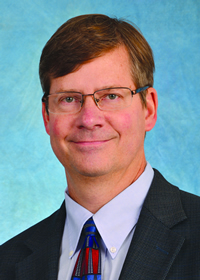
“What makes our meeting unique is that we are able to offer something for everybody,” said Annual Meeting Program Committee (AMPC) Chair Richard F. Loeser, Jr., MD, Herman and Louise Smith Distinguished Professor of Rheumatology, Allergy and Immunology, and Director of Basic and Translational Research for the Thurston Arthritis Research Center at the University of North Carolina School of Medicine. “You can select fantastic sessions and learn the newest in basic science as well as the newest treatments that are emerging and at the same time connect with colleagues from all over the world. This is the premier meeting in rheumatology because we cover the breadth of rheumatology.”
The Basic Science track is designed for researchers and academicians seeking cutting-edge science. The Business/Administration track helps practice managers, clinicians, and health professionals get information about business, regulatory, and compliance issues that can impact a rheumatology practice. Clinical Practice is designed for clinicians and health professionals in search of the latest developments in patient care. Clinical Science examines the practical treatment applications of the latest research findings for researchers, clinicians, and health professionals. You will also find sessions highlighted for health professionals, whose needs and interests span multiple tracks.
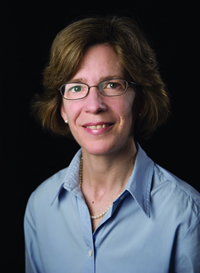
BASIC SCIENCE TRACK
The Basic Science track highlights the most important scientific advances in rheumatology, but the most important don’t always start out in our field.
“There is tremendous excitement in the cancer world involving new immunotherapies, in which patients’ own T-cells are altered, or engineered, to attack their tumor cells,” said AMPC Basic Science Sub-chair Lindsey A. Criswell, MD, MPH, Jean. S. Engleman Distinguished Professor of Rheumatology at the University of California, San Francisco. “This is conceptually very similar to autoimmune disease, where you have your immune system attacking your own tissues. There has been impressive success in the cancer world and some very strong suggestions that we may be able to take similar approaches in the treatment of autoimmune disease.”
T Cell-based Treatments: The Next Generation of Immunotherapies will explore the latest findings related to T-cell-based immunotherapy and autoimmune disease on Monday, Nov 9. Early work in autoimmune diseases such as type 1 diabetes now extends into rheumatic diseases. Some of the successful T-cell-based immunotherapies in oncology can induce autoimmune side effects that mimic rheumatic diseases.
Scleroderma has long been one of the most frustrating and discouraging of the rheumatic diseases because of the lack of effective treatments and seeming inability to effectively manage symptoms. But rheumatologists may be on the verge of being able to offer therapies that can offer significant improvements in quality of life.
There have been impressive advances in antifibrotic therapies that may be applicable to scleroderma. Fibrosis and New Therapeutic Approaches will explore recent advances in the treatment of pulmonary fibrosis and other fibrotic diseases later on Monday.
“These new treatments are being hailed as the first therapies that actually do something for idiopathic pulmonary fibrosis,” Dr. Criswell said. “Since our patients with scleroderma, some with rheumatoid arthritis, and more rarely patients with lupus, get this same kind of fibrotic process in the lungs, these therapies could be similarly useful in rheumatology.”
A third key development is the growing application of big data to rheumatologic research. The same techniques that have been used to analyze trillions of points of molecular, clinical, and epidemiological data to identify and validate new treatments as well as new uses for existing drugs are being trained on rheumatologic diseases. On Tuesday, Nov. 10, Utilizing Big Data to Advance Rheumatology will explore the convergence of genetic and molecular findings with the vast clinical resources of electronic health records to shed new light on the management of autoimmune diseases.
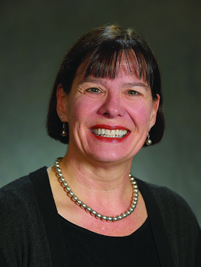
BUSINESS/ADMINISTRATION TRACK
During Legislative Update, the centerpiece of the Business/Administration track, a senior member of Congress will provide a Capitol Hill perspective on health care legislation, and the Government Affairs Committee will report on ACR’s broad legislative program. The update opens the program on Sunday, Nov. 8.
“A critical piece of legislation in which we have taken a leadership role is the Patients’ Access to Treatments Act, or PATA,” said AMPC Government Affairs Liaison Sharon L. Kolasinski, MD, Professor of Clinical Medicine at the Perelman School of Medicine and Director of Rheumatology at the Penn Musculoskeletal Center at the University of Pennsylvania.
“This bill will help support change in the tiering of medications,” she said. “Many of the latest and greatest biologics that we use in the treatment of rheumatic diseases have been put on tier four by a lot of payers, putting them out of reach for patients. Out of pocket expenses for patients can run to the thousands of dollars per month for out of pocket expenses, even for patients who have insurance. This practice effectively denies access to care even when safe and effective treatments are available.”
Other important legislative initiatives include the ICD-TEN Act, designed to ease the transition to ICD-10, and expanded funding for the National Institutes of Health.
The College is building on its long years of experience in federal legislative and regulatory affairs by launching similar efforts at the state and regional levels. An Hour Well Spent: Successful Stories of Members Enhancing Patient Care Through State Advocacy will explore the early results of this new program on Monday, Nov. 9.
“Trying to influence decision makers at the state level is a new direction for rheumatology,” said Colin C. Edgerton, MD, CORC Representative to the AMPC and partner at Low Country Rheumatology in North Charleston, SC. “Many of the current health care challenges are specific to certain states or geographic regions. This session will present what we have learned about best practices that can be effective in influencing state and regional decision makers.”
A third key session is Group Practice Without Walls, also on Monday. The session will dissect some of the new payment models coming to rheumatology and other medical specialties. One of the most talked-about models, the “supergroup” or “group practice without walls,” focuses on collaborative care in the private practice setting in order to improve the quality of care and improve patient outcomes.
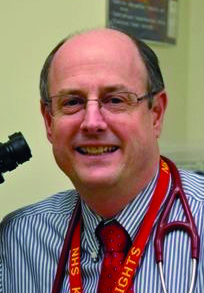
CLINICAL PRACTICE TRACK
Evolving research continues to drive changes in clinical practice at a pace that can make it tough for clinicians to keep up. A full slate of clinical practice sessions can help.
The focus of this year’s Great Debate, Long-term, Low-dose Corticosteroid Use in the Treatment of Rheumatoid Arthritis, leapt from research to practice in just three years. The debate is scheduled for the afternoon of Sunday, Nov. 8.
“The data from a two-year trial of methotrexate plus 10 mg of prednisone vs. methotrexate plus placebo concluded that clinical improvement was better in patients who got the low-dose steroid than in patients who did not,” said AMPC Clinical Sub-chair Gregory C. Gardner, MD, Bruce C. Gilliand, MD-Lucile T. Henderson Endowed Professor in Rheumatology at the University of Washington.
“Radiographic outcomes were better, patients needed fewer medications, and researchers didn’t report additional side effects compared to patients not on steroids,” he said. “Our internal medicine colleagues have wondered why we don’t use low-dose steroid more often. It will be interesting to see what the discussants say.”
The focus shifts to systemic disease on Monday. Evidence Based Assessment and Treatment Options for Interstitial Lung Disease in Patients with Systemic Sclerosis will explore current therapeutic options, including the latest data on the use of mycophenolate.
“We’ve all been waiting for something to tell us whether what we do for our patients with ILD actually works,” Dr. Gardner said. “The session will also be covering autologous stem cell transplants for scleroderma ILD.”
One of the most interesting clinical offerings spans the Clinical Science and Clinical Practice tracks on Tuesday, Nov. 10, Prospects for Treating Rheumatic Diseases Through Modification in the Microbiome. Deliberate modification of the gut microbiome has already produced interesting results in animal models of rheumatic disease. It is entirely possible that changes to the gut microbiota can modify the anti-inflammatory milieu for patients with inflammatory autoimmune diseases.
Later that day, Current Topics in Myositis will explore some of the newer and less common forms of myositis. Clinicians can expect an update on autoimmune necrotizing myopathy and antisynthetase syndrome.
“Another series that is always helpful is the Medical Aspects presentations,” Dr. Gardner said. “This year we’re looking at Can We Replace Warfarin? An Update on the Direct Oral Anticoagulants on Sunday, Nov. 8, Fatty Liver and the Rheumatology Patient on Monday, Nov. 9, and Lipid Lowering in 2015: How Low Can You Go? on Tuesday, Nov. 10. These talks bring wisdom from other fields that directly impact our patients.”
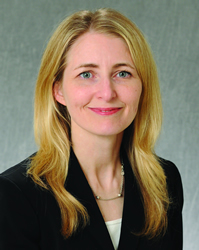
CLINICAL SCIENCE
“A great way to start the Annual Meeting is with the Year in Review on Sunday morning, Nov. 8,” said Abstract Selection Sub-chair Victoria K. Shanmugam, MBBS, MRCP, who helped select clinical abstracts for the gathering. “This is easily the most succinct update you will find anywhere on what is newest and most important in rheumatology for the year. It gets you set for the flood of information that will be coming your way over the next few days.”
One of the most important clinical science sessions of the meeting opens that same morning. Coming to a Joint Near You: Chikungunya presents the latest basic and clinical findings on the emerging relationship between chikungunya viral infections and rheumatologic symptoms. The disease itself is not new, but it is spreading rapidly into tropical and subtropical areas worldwide, including the Americas.
“Having seen chikungunya and its rheumatologic consequences personally in the clinic, I am quite excited about this review of the pathologic mechanisms of the disease and the available treatments for its clinical manifestations,” said Dr. Shanmugam, Associate Professor and Director of Rheumatology at The George Washington University School of Medicine and Health Sciences.
Dr. Shanmugam always finds time to attend each day’s plenary session. There are three plenaries on the schedule at 11:00 am – 12:30 pm on Sunday, Monday, and Tuesday. These three sessions present the newest and the most important developments in current clinical and research science. Presentations are selected from the thousands of abstracts submitted to the Annual Meeting and represent the current state of the art in rheumatology.
Her final must-attend session is the Rheumatology Round-up: Highlights from the 2015 Annual Meeting on Wednesday morning, Nov. 10. No one can possibly attend all of the key sessions over the entire course of the Annual Meeting, Dr. Shanmugam said, and this final roundup is one way to ensure you didn’t miss any of the vital presentations.
“This is one of the most respected meetings in rheumatology because we get some of the most cutting-edge research in clinical science submitted to our committee,” she said. “Rheumatologists from all over the world make a point of coming to this meeting for the same reason. The ACR/ARHP Annual Meeting is where you hear about all the hot issues and all the latest developments in rheumatology.”
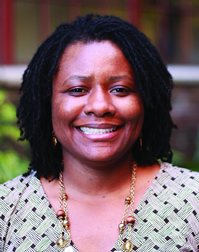
HEALTH PROFESSIONALS
The role of health professionals in rheumatology is growing and so are the number and variety of ACR/ARHP sessions designed for them.
“The Annual Meeting is a great opportunity to gain knowledge in specific content, to improve your practice, to learn about the newest trends in rheumatology, and to connect with other health professionals who are practicing, teaching, or conducting research in rheumatology,” said Annual Meeting Planning Committee ARHP Sub-chair Hazel L. Breland, PhD, OTR/L, Assistant Professor of Occupational Therapy at the Medical University of South Carolina.
“This is ARHP’s 50th anniversary, so we are taking a good look at how things have progressed and where we go from here to advance rheumatology. Attendees should be thinking about their patients’ sexual health, effective management of your practice, the empowerment of patients to include them in the management of their care, and the inclusion of more diverse patients in research. Finally, we have sessions that explore all those gaps.”
The first event in the professional program is the ARHP Keynote, Cultural Humility for Rheumatology Health Professionals on Sunday, Nov. 8. Vivian R. Chavez, DrPh, MPH, Associate Professor of Health Education at San Francisco State University, will explore the principals and practices of cultural humility in the rheumatology practice.
Sexual health has emerged as an important but too often ignored issue for patients with a variety of rheumatologic diseases. The 2015 program has three sessions focused on this key area.
The first is Pregnancy and Infertility in Rheumatic Disease on Monday, Nov. 9. Sexual Issues in Rheumatology: Assessment and Intervention will explore the variety of sexual disorders seen in patients with rheumatologic diseases and strategies to help patients manage with sexual dysfunction on Tuesday, Nov. 10. Later that day, Lesbian, Gay, Bisexual, Transgender and Queer (LBGTQ): Conversations and Care will introduce emerging issues related to sexual identity and orientation.
“In too many instances, people don’t ask questions about sexual health. They make assumptions,” Dr. Breland said. “We are excited to finally look at some of the special medical needs and issues of patients in the LGBTQ community. There are ways the office visit can be made supportive for rheumatology patients who are part of the LGBTQ community. But you have to think about it before you can act.”
